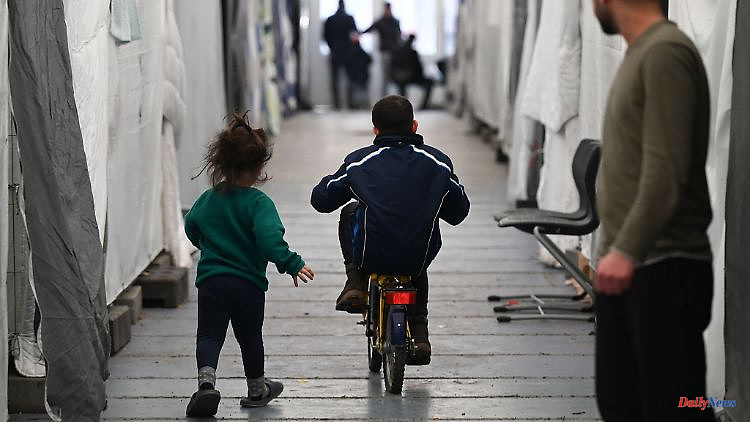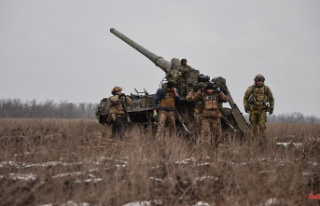Before the refugee summit this Thursday in Berlin, Hesse's municipalities are asking for help from the federal and state governments. You alone could not manage the accommodation of refugees. Calls to limit immigration are becoming louder.
Mühlheim/Bensheim (dpa/lhe) - Hesse's municipalities are increasingly reaching their limits when it comes to accommodating refugees. There is a lack of living space, money and staff. Before the migration summit of the federal, state and local governments on Thursday, there are calls to limit the influx. "The situation is very difficult," says David Rauber, Managing Director of the Hessian Association of Towns and Municipalities. It is a major effort for many municipalities - "organizationally, personally and financially, but also with a view to acceptance among the population".
Currently there are hardly any additional apartments available. "Living space was and is scarce and expensive in Hesse, new apartments are not built overnight. Prices for container or tent solutions have risen, just to address a few practical problems." Comprehensive financing commitments are needed for more planning security and insight from the federal and state governments as to how difficult the local situation is. "We demand full funding of this difficult task from the federal and state governments, but also tools such as exemption from additional requirements, facilitation in the construction and financing of housing, fair distribution of the refugees in Europe and the security that decisions are made quickly about who is allowed to stay and who not."
The district of Bergstrasse demands that the municipalities only assign people to accommodation who also have a realistic perspective of the right to remain. This does not apply to refugees from Ukraine, explains spokeswoman Cornelia von Poser. "Of the 1,232 people who were assigned from the so-called third countries in 2022, around 50 percent have no realistic prospects of being entitled to stay." However, they would tie up the scarce space and human resources on site, so that integration work for people with prospects could not be done.
The district currently operates three larger accommodations, including a tent city in Bensheim, which was intended as a short-term stay for new arrivals, but is now used as normal accommodation. According to the spokeswoman, these accommodations offer space for 1665 people in total, 1315 places are currently occupied. A further 360 places are to be created in a former hotel and container facility. Of the 2,872 people from Ukraine who were assigned to the district last year, 1,235 are housed in communal accommodation and apartments.
"The number of people assigned per week is already at a high level, at 61," explains von Poser. They could only be accommodated by the district with difficulty because there was a lack of space and buildings and the people from the large accommodations could not be distributed to other accommodations or placed in apartments. In addition, there is a lack of specialists for processing the granting of benefits and for support. Despite advertisements, these positions could not be filled.
District administrators and mayors from the Main-Taunus district recently wrote an urgent letter to Chancellor Olaf Scholz (SPD) and Prime Minister Boris Rhein (CDU) to actively control and limit the influx of refugees. According to press spokesman Johannes Latsch, a total of 1,223 refugees from Afghanistan, Syria, Turkey, Iran and Iraq were assigned to the district in 2022. "In addition, there are around 2,500 refugees from Ukraine, most of whom didn't come through a central assignment from the country, but individually," he explains.
The refugees are accommodated in container systems, rented private houses and hotels. "According to the current status, the places will last until the end of the first quarter." If available, the plan is to rent further container systems and other objects. "There is a lack of living space. The housing market is tight," explains Latsch. It is not clear that the problem is steadily increasing as a result of the weekly assignments of refugees. "We expect the federal government to take our concerns seriously and to reform the current procedure for allocating refugees."
"We are not yet at the limit, but the situation will worsen for us over the course of the year," says Harald Kühlborn, spokesman for the Kassel district. The accommodation options are limited. The biggest problem is financing the task of looking after the refugees. "On the part of the state of Hesse, the corresponding flat rates usually come with a long delay," explains the spokesman. The district is still waiting for around 7.5 million euros from 2022.
Interior Minister Peter Beuth (CDU) explains that Hesse is supplementing the federal funds to the municipalities with additional state funds to a very considerable extent. According to the ministry, 114,500 refugees were admitted to Hesse in 2022, 96,500 of whom came from Ukraine. The country spends around 800 million euros on refugees. 500 million euros came from state funds, around 300 million euros from the federal government. Now the federal government must finally play an active role, Beuth demands. The pressure in the municipalities continued to grow. There is an urgent need for action. "The ability to absorb those seeking protection and the integration of immigrants can only be maintained in the long term if migration is more closely coordinated and regulated."












